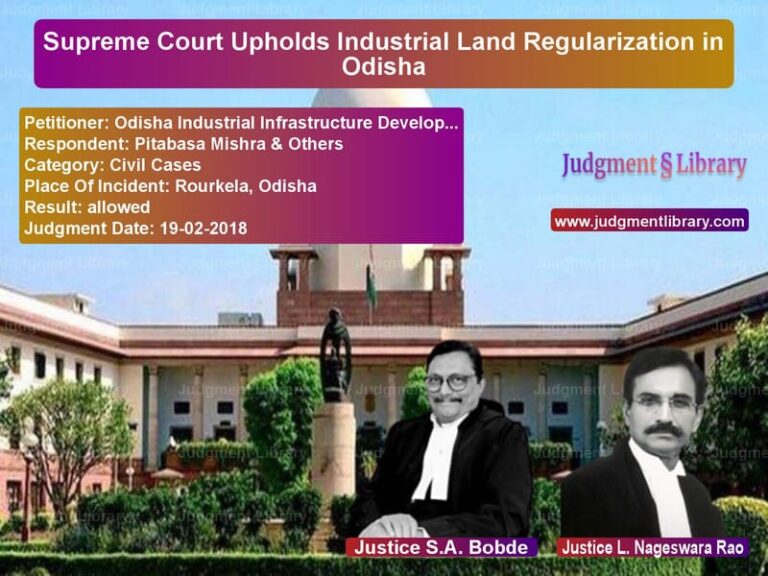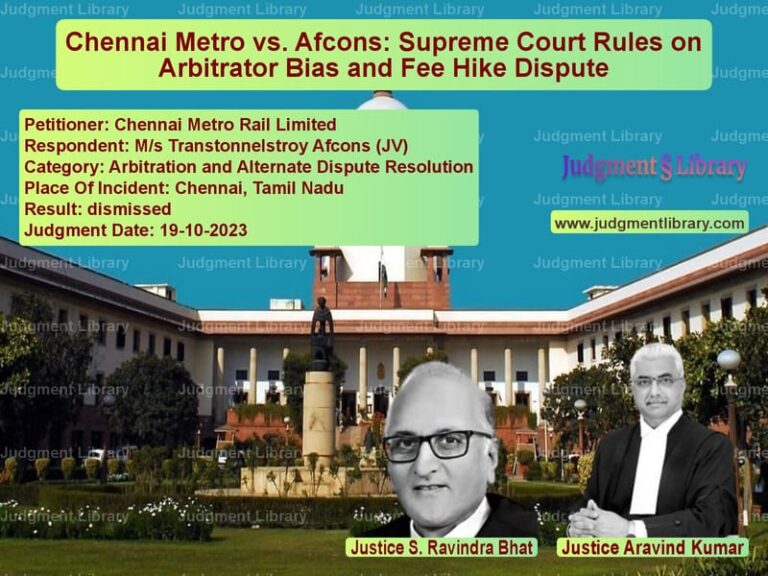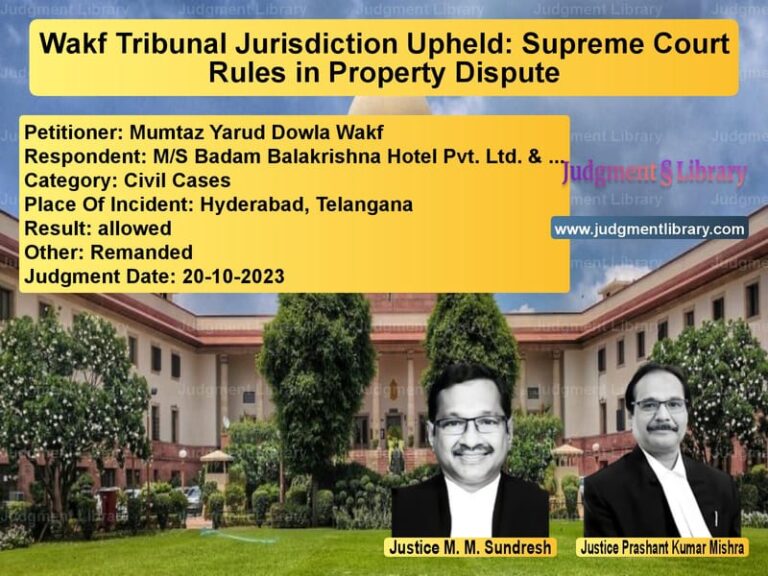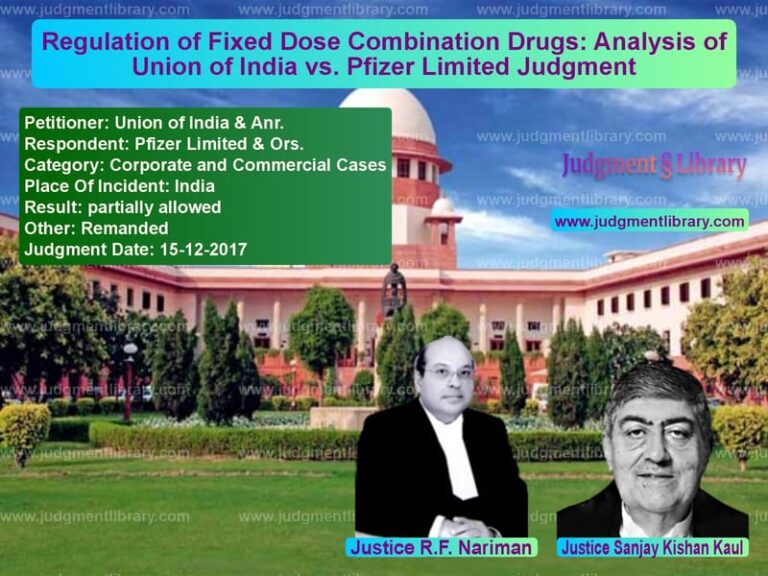Bihar School Examination Board: Legal Challenges in Retirement Age for Employees
The case of Gopal Prasad vs. Bihar School Examination Board & Others is a significant one in the context of employee retirement and pension benefits under the Bihar Service Code. The case specifically revolves around the retirement age of government employees who were appointed before attaining the age of 18. Gopal Prasad, the appellant, challenges the decision of the Bihar School Examination Board (BSEB) regarding his retirement based on the length of service rather than his age. This case discusses key issues related to superannuation age, qualifying service for pension, and the rules governing government employees in Bihar.
The case brings into focus the complexities of interpreting service rules, particularly in light of evolving policies on the minimum age for government service appointments. This judgment also sheds light on how government circulars and resolutions can impact the service conditions of employees, even if they were appointed under different provisions.
Background of the Case
The appellant, Gopal Prasad, was appointed as a Calligraphist-cum-Assistant by the Bihar School Examination Board (BSEB) on May 20, 1970, at the age of 15½ years. At the time of his appointment, there was no minimum age requirement for joining the Board. However, the rules governing pensionable service stipulated that an employee’s service would not count towards pension benefits if the employee had not attained the age of 16 years at the time of appointment.
In 1998, the Bihar government issued a circular raising the minimum age for government appointments to 18 years. The circular, however, applied only to appointments made after its issuance and did not affect employees like Gopal Prasad, who had already been appointed. In 2004, the Bihar School Examination Board passed a resolution to treat employees who had been appointed below the age of 18 as having completed 18 years of age on the date of their appointment for retirement purposes.
In 2012, Gopal Prasad’s retirement was based on the application of this resolution, but he contested it, arguing that his actual retirement age should be calculated based on his date of birth (19th November 1954), which would make him eligible to continue in service until he reached 60 years of age.
Legal Issues Considered
- Whether an employee who was appointed before reaching the age of 18 should be treated as having completed 18 years on the date of their appointment for retirement purposes.
- Whether the age of retirement under the Bihar Service Code can be altered by a resolution passed by the Bihar School Examination Board.
- Whether the length of service can be used as a criterion for determining the retirement age.
- The applicability of the Bihar Pension Rules and the rules governing qualifying service for pension to employees appointed at a young age.
Arguments of the Petitioner (Gopal Prasad)
- The appellant argued that, according to the Bihar Service Code, the age of retirement is determined by the actual date of birth of the employee, which in his case is 19th November 1954.
- He contended that the circular issued by the Bihar government in 1998 and the subsequent resolution by the Bihar School Examination Board could not alter his actual retirement age, which should be 60 years as per the service records.
- Further, he argued that the length of service should not be the determining factor for retirement, and the rules governing the age of superannuation should be followed strictly.
Arguments of the Respondent (Bihar School Examination Board)
- The respondents argued that the resolution passed by the Bihar School Examination Board in 2004 was aimed at addressing the issue of employees appointed before attaining the age of 18.
- The respondents maintained that the resolution treated the employees as having completed 18 years of age on their date of appointment to ensure they were not deprived of pensionary benefits for the period before they attained the qualifying age of 18.
- The respondents further argued that the appellant had completed 42 years of service, and thus, in accordance with the resolution and applicable rules, he was retired on completion of this period, which was in line with the age of superannuation prescribed for employees in Category-4.
Supreme Court’s Analysis
The Supreme Court examined the legal and factual aspects of the case, focusing on the application of the Bihar Service Code, the Bihar Pension Rules, and the government resolutions regarding retirement age and qualifying service for pension.
Age of Superannuation
The Court began by reviewing Rule 73 of the Bihar Service Code, which prescribes the age of superannuation as 58 years, later amended to 60 years for certain categories. The Court noted that the rules did not prescribe length of service as a criterion for retirement and that the age of retirement is determined by the actual age of the employee, not the deemed age based on their date of appointment.
The Court also examined the circular issued by the Bihar government in 1998 and the resolution passed by the Bihar School Examination Board in 2004. The resolution aimed to regularize the service of employees who had been appointed before reaching the age of 18, ensuring they would not be deprived of pensionary benefits for the period of service before attaining the age of majority.
Rule 5 of the Bihar Pension Rules
The Court analyzed Rule 5 of the Bihar Pension Rules, which raised the minimum age for government service to 18 years. The Court acknowledged that the rules were amended to ensure that employees who entered service before reaching the age of 18 would be considered to have reached that age for the purpose of retirement and pension.
The Role of Legal Precedents
The Court also referred to various precedents, including the judgment in Ragjawa Narayan Mishra (supra), which dealt with the interpretation of pension rules and the retirement age for employees. The Court emphasized that the law should be applied consistently and that deviations from established rules should be based on clear legal provisions, not administrative resolutions.
Key Findings
- The age of superannuation should be based on the employee’s actual age as per their date of birth, as recorded in the service records.
- The resolution passed by the Bihar School Examination Board in 2004, which treated employees appointed before the age of 18 as having attained the age of 18 on their appointment date, was intended to ensure pensionary benefits but should not affect the employee’s actual retirement age.
- The length of service is not a valid criterion for determining the retirement age under the Bihar Service Code, and employees should retire upon reaching the prescribed age of superannuation, which in this case is 60 years.
Final Judgment
The Supreme Court ruled in favor of the appellant, Gopal Prasad, holding that he should be entitled to continue in service until he reaches the age of 60 years as per his actual date of birth. The Court set aside the High Court’s judgment and the decision of the Bihar School Examination Board to retire him prematurely based on 42 years of service. The appellant was entitled to all consequential benefits, including arrears of pay and pensionary benefits, as per his actual retirement age of 60 years.
Implications of the Judgment
- This ruling clarifies that the age of superannuation for government employees should be determined based on their actual age, as recorded in the service records, and not by arbitrary administrative resolutions.
- The judgment ensures that employees who were appointed at a young age and worked for many years are not penalized by arbitrary rules regarding their retirement age and pension.
- The ruling also emphasizes the importance of adhering to statutory rules and guidelines when determining the retirement age and qualifying service for pension benefits.
Conclusion
The Supreme Court’s decision in Gopal Prasad vs. Bihar School Examination Board reinforces the importance of following established legal rules regarding retirement and pension benefits for government employees. By ruling in favor of the appellant, the Court upheld the principle that the actual age of superannuation is the age as recorded in the service records, and not based on arbitrary administrative decisions. This judgment serves as an important precedent in understanding the application of pension rules and the retirement age of government employees.
The ruling also underscores the need for fairness and consistency in the application of rules governing retirement and pension, ensuring that employees are not unfairly deprived of their entitlements based on discrepancies or administrative errors.
Petitioner Name: Gopal Prasad.Respondent Name: Bihar School Examination Board & Others.Judgment By: Justice Indira Banerjee, Justice Ajay Rastogi.Place Of Incident: Patna, Bihar.Judgment Date: 28-05-2020.
Don’t miss out on the full details! Download the complete judgment in PDF format below and gain valuable insights instantly!
Download Judgment: Gopal Prasad vs Bihar School Examina Supreme Court of India Judgment Dated 28-05-2020.pdf
Direct Downlaod Judgment: Direct downlaod this Judgment
See all petitions in Pension and Gratuity
See all petitions in Employment Disputes
See all petitions in Workplace Harassment
See all petitions in Judgment by Indira Banerjee
See all petitions in Judgment by Ajay Rastogi
See all petitions in allowed
See all petitions in supreme court of India judgments May 2020
See all petitions in 2020 judgments
See all posts in Service Matters Category
See all allowed petitions in Service Matters Category
See all Dismissed petitions in Service Matters Category
See all partially allowed petitions in Service Matters Category







